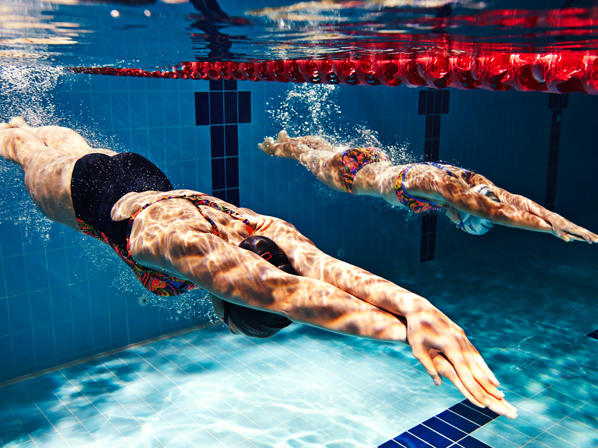
FUNdamentals – Childhood (Basic Movement Literacy)
The FUNdamentals stage should be structured and fun because a child’s attention span is short and there is a strong need for positive re-enforcement. The skills to be developed during this stage are are:
- ABCs (Agility, Balance, Coordination, Speed)
- RJT (Running, Jumping, Throwing)
- KGBs (Kinesthetics, Gliding, Buoyancy)
- CPKs (Catching, Passing, Kicking)
As the size of the heart increases in relation to the rest of the body, endurance should be developed using fun and games. Children should have fun and be active during this stage. This is the stage where the swimmers ‘motor skills’ are developing at their greatest rate, so it is the most critical stage where these skills are taught and developed for maximal effect.
At Warley WASPS, our swimming sessions, especially during the Learn to Swim Pathway, incorporate elements from all of the above stages to help, not only in swimming, but also to help during the child’s early growth development.
SwimSkills – Late Childhood (Building Technique)
During the SwimSkills period, the nervous system is almost fully developed and there are rapid improvements in the coordination of movement skills. As a result, young people should learn how to train and develop sport specific skills. This is a good time to work on developing excellent technique in all four strokes as well as starts, turns and finishing skills.
A multi-stroke approach to training and competition will help to reduce the likelihood of injury and also ensure interest levels remain high with the result that swimming should continue to be fun. Studies have also shown that swimmers who do not specialise early may have a slower initial increase in performance; however, they ultimately reach a higher level of achievement and are more likely to have a longer life in the sport.
Swimmers should also learn the basic technical and tactical skills, (known as the ancillary capacities) which include:
- Warm up and cool down
- Stretching
- Hydration and nutrition
- Recovery
- Relaxation and focusing
Although the focus is on training, competition should be used to test and refine skills. The recommended training to competition ratio is 75% to 25%.
If a young swimmer misses this stage of development then he/she is unlikely to reach their full potential. One of the main reasons athletes plateau during the later stages of their careers is because of an over emphasis on competition instead of taking full advantage of training during this very important stage.
Training to Train – Adolescence (Building the Engine)
For adults, in short events e.g. less than 45 seconds in duration, energy it is derived predominantly anaerobically. Prior to puberty, the greatest proportion of a young person’s energy is derived aerobically. Anaerobic metabolism as a proportion of overall energy output is small. Therefore, energy derived aerobically is very important in swimming.
During the Training to Train stage, there should be an emphasis on aerobic or endurance conditioning. The cardiovascular system determines the efficiency of the heart and lungs; these organs are developed through building up work on longer distances. Swimming is an endurance sport – most events last 45 seconds or more. Training and competition for young swimmers should therefore have an endurance base.
This should be the stage of greater individualisation of fitness and technical training. The focus should still be on training rather than competition and the training should be predominantly of high volume low intensity workloads. High volume low intensity training cannot be achieved in a limited time period and therefore the time commitment to training is likely to increase significantly. There should now be specific targets for each competition, with a view to learning basic tactics and mental preparation.
During this stage, training should continue to develop suppleness and include the use of ‘own body weight’ exercises such as medicine ball and Swiss ball exercises. Towards the end of this stage preparations should be made for the development of strength, which for girls occurs at the end of this stage and for boys at the beginning of the next stage. This should include:
- Learning correct weight lifting techniques without any resistance.
- The knowledge base of how to warm up and warm down.
- How and when to stretch.
- How to optimise nutrition and hydration.
- Mental preparation.
- Regeneration.
- How and when to taper and peak.
Training to Compete – Early Adulthood (Optimising the Engine)
During the training to compete stage there should be a continued emphasis on physical conditioning with the focus on maintaining high volume workloads but with increasing intensity. Emphasis should be on developing individual strengths and working on weaknesses. This should be achieved through practising technical and tactical skills based around specific strokes at all distances, or specific distances across a range of strokes.
The year should be divided into either two or three cycles of training and competition and the ancillary capacities should be refined more specific to the individual’s needs.
Training should also focus on developing strength gains through the use of weights. This should be coupled with continued work on core body strength and maintaining suppleness.
Training to Win – Adulthood (Maximising the Engine)
This is the final stage of athletic preparation. The emphasis should be on specialisation and performance enhancement. All of the swimmer’s physical, technical, tactical, mental and ancillary capacities should now be fully established with the focus shifting to producing the best possible performance. All aspects of training should be individualised for specific events. There should be two, three or more training cycles, depending on the events being trained for. During this stage, training should continue to develop strength, develop core body strength and maintain suppleness.
Millennum WASPS – The only Aquatics club in Sandwell offering a comprehensive Swim England Learn to Swim Programme

